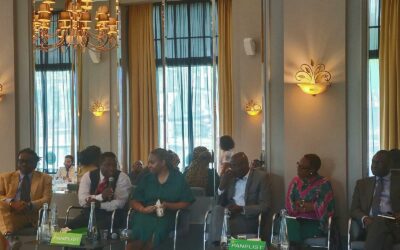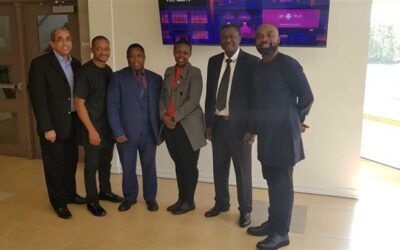#BeyondAid:
Rerouting Africa Europe Relations
As European institutions have engaged negotiations with African partners in view of jointly defining a new comprehensive EU strategy with Africa, ADEPT and Meridia Partners co-organised a series of events between September and October 2020, covering five themes of relevance for a true and fair partnership between Africa and Europe: debt, migration, youth, climate, trade & investment.
The discussions were meant to increase the share of voice for African private sector, civil society and diaspora organizations in the framework of the upcoming AU-EU Summit in 2021. They were designed to discuss the ability to align Africa and European priorities, and deliver on the narrative of a renewed Africa-Europe relationship, which focuses on moving away from dependency towards partnership.
Here is a summary report of the main insights and ideas that emanated from the events.
DEBT
- To stand a chance to move beyond the archaic donor-recipient relationship, and live up to the EU’s commitment to building a “partnership of equals”, debt relief should be an integral part of the EU’s comprehensive Strategy with Africa.
- The current pandemic is an opportunity for the EU to take the lead in cancelling Africa’s debt and set an important precedent by coordinating a global response. Africans do not forget that debt payments are one of the root causes of the current state of public health infrastructure across the continent. In 2019 alone, most countries spent way more on debt payment than on public health.
- Debt relief, trade and aid are interconnected. African states should make every effort to meet good governance targets, curb corruption and fraud, open up their economies and liberalize trade. On the other hand, EU Member States, especially those in favour of more conditionality, need to clarify their positions.
- While debt cancellation has the potential to release several billions of dollars annually in resources that some nations can use for development, African states should create task forces at the national level to tackle the issue of private debt cancellation in a coherent manner without jeopardizing long-term access to capital.
- Africa and the EU should collaborate closely to ensure that debt relief is not used by African governments to pay high interest to private lenders, at a time when public money is desperately needed to manage the socio-economic consequences of the Covid-19 pandemic.
- Debt write-off is in the interest of the EU and its member states. The social and economic consequences of the crisis in Africa will be magnified if African states can no longer access international funding – with a direct impact on conflicts and migration flows.
MIGRATION
- African and European leaders need to move beyond the rhetoric of the “sister continents” and simply agree to disagree: their interests differ dramatically on a number of important issues, including agriculture, governance, societal value, international criminal justice or migration.
- Migration and security go hand in hand. While 80% of migration flows are within Africa, it is high time for the EU to tackle the root causes of migration, and strive to better understand the real objectives, motivations and ambitions of African migrants. On the other hand, the an ambitious, reliable and efficient migration management system by the AU could make its Member States fully accountable.
- It’s all about creating jobs. It is time to put the private sector front and center in the migration discussion between Africa and the EU. On this multi-faceted issue, private sector organizations can identify solutions and bottlenecks at every stage of decision-making.
- In Africa, local leadership can play a role in the prevention. Public policies that empower local decision-makers should be encouraged as an important area of cooperation between Africa and Europe.
- On this issue, and many others, the EU must speak to “One Africa”. As the Africa is moving towards continental integration, the EU’s overlapping dialogue frameworks (through the AU, the OACPS and the European Neighbourhood Policy) resonate as old structures that perpetuate political fragmentation – and competition. It’s time to streamline these frameworks and approach Africa in a way that reflects the aspirations of the African continent. In this context, the role of African diasporas should not be underestimated.
- Europe needs a proper public diplomacy and outreach strategy that goes beyond one-sided information campaigns to help clarify European objectives and positioning while sharpening its capacity to listen to what’s truly happening on the ground. This is valid for both the EU and its Member States.
YOUTH ENTREPRENEURSHIP
- Behind the current crisis is a unique opportunity to boost youth entrepreneurship, digitalisation and the green transition. Progress in those three areas – which are key priorities outlined in the new EU Strategy with Africa – won’t just happen without massive involvement of African youth organizations.
- Youth empowerment cannot happen without improved governance. African governments’ inability to respond to the needs of the youth are a root cause of political unrest and instability.
- Investing in digital capabilities is the way to go, especially as Africa has demonstrated leadership in mobile money and fintech innovations, now replicated across the world. Against this background, both the EU and the AU urgently need to upgrade their channels and networks and improve their access to concrete, realistic ideas to boost innovation and employment. African youth organisations and diaspora networks should be their first port of call to source brilliant ideas to connect and support local innovation ecosystems.
- The AU should take the lead in building a platform to improve access to EU grants and funding opportunities.
- Due to Brexit, it is increasingly important to involve diaspora youth organisations from EU Member States that have no historic, traditional ties with Africa. Amplifying their voices can help reshape the dialogue between both continents, highlight strategic priorities, challenges and solutions (for example in terms of knowledge transfer, sectoral analysis or local production) and, all in all, avoid the failure of political imagination.
- The EU should be a better listener. Past decisions showed that it could not fully grasp the lack of interest and levels of frustration coursing through African nations, especially with young Africans. The EU Commission cannot always fall back on migration, values and other issues of self-interest, when finding and creating jobs is what young Africans are focused on.
- Since over half the global workforce will need to reskill in the future of work, governments must invest in the digital infrastructure needed to enable Africa’s largely young population and the new generation of tech entrepreneurs to thrive.
CLIMATE
- Africa doesn’t need more aid. What Africa urgently needs right now is a strong, reliable partner that can help co-build energy management solutions to address the immediate needs of its populations. Access to secure, affordable and sustainable energy, and more investment in African energy infrastructure should be one of the drivers of the Africa-EU Partnership.
- Climate diplomacy needs to be at the center of most African countries’ foreign policies and, most definitely, an important axis of their future relationship with the EU. Similarly, People-centered climate action should underpin all African policies, at all levels of policymaking (from local, national, regional to continental).
- The European Investment Bank (EIB)’s plan to significantly increase engagement in Africa is a welcome development. However it is important for the EIB, through its new Energy Lending Policy, to closely align its financing with local realities and collaborate with local institutions to effectively address the needs of the communities most vulnerable to climate change.
- The African Union should launch open and transparent consultations on a EU-Africa green growth agenda, with a focus on shared interests: green investments and job creation.
- A Green Deal “with” Africa might be the ultimate test for a true partnership of equals between both continents. Realistically, it cannot succeed without addressing Africa’s concerns, and taking into account concrete aspirations from across the spectrum of African stakeholders, not only Addis-based institutions.
- It is in the interest of the EU institutions to reach out to African private sector organisations and clarify how the EU Green Deal will not create trade distortions and impose new barriers to African exports.
TRADE
- The EU needs to reassess its trade policies towards Africa, in terms of relevance, coherence and sustainability. Past agreements focused too much on trade and less on investment.
- The fact that African leaders are pressing forward with their own trade agenda and looking to fast-track the establishment of a Continental Free Trade Area (AfCFTA), to boost intra-African trade is a clear signal that trade and investment are at the top of Africa’s development agenda. Supporting the implementation of the AfCFTA should be a top priority of the Africa-EU Partnership.
- The AU and its member states should ensure stakeholder consultation on Africa-EU trade policies and include the private sector and civil society in the decision-making process. Achieving Africa’s ambitious trade agenda will take strategic communication and proactive outreach.
- While the EU is playing catch-up with not only China but also other global players, European decision-makers and businesses need to wake up to a new reality: investment and economic diversification are at the top of Africa’s development agenda. It is no longer about aid, but about bringing value, i.e. practical, local solutions that benefit African societies.
- The EU should encourage the diversification of African exports. In line with the EU’s commitment to a ‘partnership of equals’, it is time to re-assess the factors that restrict export capacities of African companies and look at ways to increase the relevance of the EU’s Generalised Scheme of Preferences (GSP) for Africa, given that the continent has the biggest number of GSP beneficiaries but only represents less than 5% of all GSP imports to the EU.
We will need all of our combined creativity in the coming years in order to make room for a true partnership of equals between Africa and the European Union.
This partnership needs vision, inspiration and imagination more than ever.
Among the many dynamics at play in this partnership is a failure of strategic communication. One of the positive features of the new EU’s Strategy with Africa is that it forces both sides to channel all their hopes, ambitions, fears, values, and dreams into this special relationship. It also – finally – confirms that the aid-driven, North-South story is a deficient narrative that does little to explain the complexity of Africa-EU relations, and even less to guide us forward.
There are certainly many divides between Africa and Europe on debt, migration, youth, climate, trade and several other issues – but we still advance on many other fronts. In order to address them we will have to put aside this outdated, single story, and develop new ways of talking (and listening) to each other.





